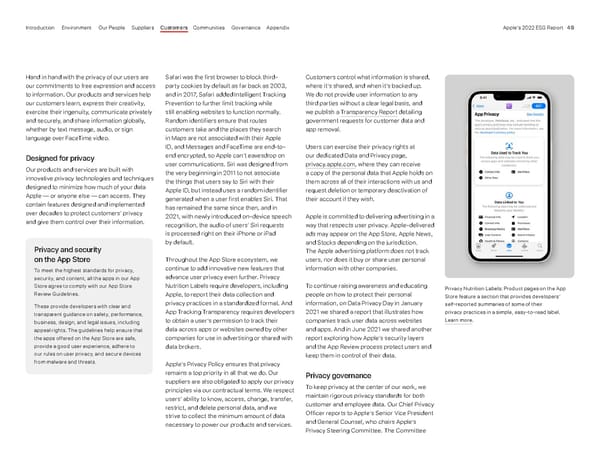Hand in hand with the privacy of our users are our commitments to free expression and access to information. Our products and services help our customers learn, express their creativity, exercise their ingenuity, communicate privately and securely, and share information globally, whether by text message, audio, or sign language over FaceTime video. Designed for privacy Our products and services are built with innovative privacy technologies and techniques designed to minimize how much of your data Apple — or anyone else — can access. They contain features designed and implemented over decades to protect customers’ privacy and give them control over their information. Safari was the first browser to block third- party cookies by default as far back as 2003, and in 2017, Safari added Intelligent Tracking Prevention to further limit tracking while still enabling websites to function normally. Random identifiers ensure that routes customers take and the places they search in Maps are not associated with their Apple ID, and Messages and FaceTime are end-to- end encrypted, so Apple can’t eavesdrop on user communications. Siri was designed from the very beginning in 2011 to not associate the things that users say to Siri with their Apple ID, but instead uses a random identifier generated when a user first enables Siri. That has remained the same since then, and in 2021, with newly introduced on-device speech recognition, the audio of users’ Siri requests is processed right on their iPhone or iPad by default. Throughout the App Store ecosystem, we continue to add innovative new features that advance user privacy even further. Privacy Nutrition Labels require developers, including Apple, to report their data collection and privacy practices in a standardized format. And App Tracking Transparency requires developers to obtain a user’s permission to track their data across apps or websites owned by other companies for use in advertising or shared with data brokers. Apple’s Privacy Policy ensures that privacy remains a top priority in all that we do. Our suppliers are also obligated to apply our privacy principles via our contractual terms. We respect users’ ability to know, access, change, transfer, restrict, and delete personal data, and we strive to collect the minimum amount of data necessary to power our products and services. Customers control what information is shared, where it’s shared, and when it’s backed up. We do not provide user information to any third parties without a clear legal basis, and we publish a Transparency Report detailing government requests for customer data and app removal. Users can exercise their privacy rights at our dedicated Data and Privacy page, privacy.apple.com , where they can receive a copy of the personal data that Apple holds on them across all of their interactions with us and request deletion or temporary deactivation of their account if they wish. Apple is committed to delivering advertising in a way that respects user privacy. Apple -delivered ads may appear on the App Store, Apple News, and Stocks depending on the jurisdiction. The Apple advertising platform does not track users, nor does it buy or share user personal information with other companies. To continue raising awareness and educating people on how to protect their personal information, on Data Privacy Day in January 2021 we shared a report that illustrates how companies track user data across websites and apps. And in June 2021 we shared another report exploring how Apple’s security layers and the App Review process protect users and keep them in control of their data. Privacy governance To keep privacy at the center of our work, we maintain rigorous privacy standards for both customer and employee data. Our Chief Privacy Officer reports to Apple’s Senior Vice President and General Counsel, who chairs Apple’s Privacy Steering Committee. The Committee Privacy and security on the App Store To meet the highest standards for privacy, security, and content, all the apps in our App Store agree to comply with our App Store Review Guidelines. These provide developers with clear and transparent guidance on safety, performance, business, design, and legal issues, including appeal rights. The guidelines help ensure that the apps offered on the App Store are safe, provide a good user experience, adhere to our rules on user privacy, and secure devices from malware and threats. Privacy Nutrition Labels: Product pages on the App Store feature a section that provides developers’ self-reported summaries of some of their privacy practices in a simple, easy -to -read label. Learn more . Appendix Governance Communities Suppliers Customers Our People Environment Introduction Apple’s 2022 ESG Report 49
 ESG Report | Apple Page 48 Page 50
ESG Report | Apple Page 48 Page 50